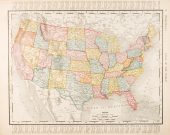The Right to Keep and Bear Property
Bump-stock devices, which are firearm accessories that allow semi-automatic rifles to fire more quickly, are a niche possession. They were used in the mass murder in Las Vegas in 2017 at the Route 91 Harvest Festival, and in the wake of that horror, their legality is up for debate. It is easy enough to understand why people with little interest in guns would take a dim view of firearm accessories that have helped to facilitate mass murder. Yet, those who favor banning bump-stock devices are not merely supporting restrictions on the right to keep and bear arms, but restrictions on the right to keep and bear property.
On Arms
In December 2018, Donald Trump’s Justice Department through the Bureau of Alcohol, Tobacco, Firearms, and Explosives (ATF) banned bump-stock devices. While rubber bands, belt loops, and shoe strings can all facilitate bump firing, such methods have been around for as long as there have been semi-automatic firearms, the first patented bump-stock device was the Akins Accelerator in 1998. This device is beneficial because it allows the shooter to fire a semi-automatic quickly and accurately, but also safely, since the device, when properly attached, is part of the gun rather than jury-rigged methods like belt loops. Since bump-stock devices are simulacra of fully-automatic weapons, they do not fire at a constant rate like machine guns.
The ATF determined in 2002 that a firearm with a bump stock does not qualify as a machine gun, and it made further clarifications between 2008 and 2017 regarding bump-stock devices. Most importantly, as of 2010, they were considered by the ATF as an unregulated firearm part, since the device does not mechanically alter the firearm’s function to fire fully automatic. Yet, under the direction of the Trump Administration, the ATF created a regulation that made what was previously legal illegal by classifying firearms with bump-stock devices as machine guns and hence, illegal by the National Firearms Act of 1986. Last fall, the Supreme Court agreed to hear a case regarding the legality of this ban.
The bump-stock device ban is a regulation created by a federal agency under the direction of the executive that renders previously common and lawful private property illegal.
A note on terminology before we proceed. Rather than using the phrases “gun owners,” “gun rights,” and the like that are commonly used even by those who support the natural right for self-defense absolutely, here the more accurate phrases such as “arms owners,” “arms rights,” and “arms laws” will be used. The Second Amendment correctly refers to “the right to keep and bear arms,” which includes guns, ammunition, and their accouterments rather than merely the right to keep and bear guns. This broader terminology correctly emphasizes that the natural right of self-defense includes not only guns, but that which they need to work, e.g. ammunition, and that which will allow them to work in a certain way, e.g. bump-stock devices. Recall that the American Revolutionary War began when the British army stole gunpowder from civilian colonists: the last straw of British misrule was the confiscation of non-gun arms.
On property
The regulation that made bump-stock devices illegal was not enacted by the US Congress, but rather created under a very expansive view of executive authority. Then-President Trump decreed that what was once legal and protected by the Second Amendment is now illegal. Both Trump and President Joe Biden (the Biden administration is supporting Trump’s position before the Supreme Court), believe that the Chief Executive has the right to create a regulation that should only be passed as a law (even if the law would be unconstitutional). The justification for such bans as the one regarding bump-stock devices is not based on the Constitution nor natural right, but rather on a purported right to safety.
The bump-stock ban directly and unequivocally limits the right to keep and bear arms that are already commonly owned and in use. In other words, those who own bump-stock devices are required either to turn in their private property to the government or else to destroy them without any recompense. This is a gross and indefensible use of executive power. To reiterate: the bump-stock device ban is a regulation created by a federal agency under the direction of the executive that renders previously common and lawful private property illegal and makes it a felony (up to 10 years imprisonment and a $250,000 fine) to continue to own it even after the same agency stated it was legal two decades before.
John Locke understood that owning private property gives the individual freedom by natural law, which is why Jean-Jacques Rousseau, the intellectual progenitor of the Committee on Public Safety, believed rather in natural compassion. Rousseau’s natural compassion is based on a subjective utopian ideal, hence there is no private property. It is natural compassion that led Trump, after the mass murder in Las Vegas, to ban bump stocks. It is this same natural compassion that led so many in the government, including Trump, to allow violations of liberty during Covid. Natural compassion is by its nature anti-liberty, and those who act according to it have, in Thomas Sowell’s terminology, the Unconstrained Vision of the Anointed.
However, there is a particular type of individual property that is met with the most loathing by those with the Unconstrained Vision. Arms frustrate totalitarian designs in government, which is why many consider the right to bear arms to be a second-class right. Arms are not only property, but the actuality of belief in the natural law rather than natural compassion. Thus, arms and those who keep and bear them are the particular enemy of the Compassionate Anointed. Arms are private property; arms owners mock the claim of the government’s monopoly over public safety by the mere action of owning arms; arms owners assert the right of the individual to protect himself, his family, and other property without dependence on the government; and civilian-owned arms remind the government to tread carefully when it comes to violating the rights of the individual.
While bump-stock devices can be used in conjunction with semi-automatic rifles for nefarious purposes by malevolent men, this does not justify the violation of natural rights in the name of natural compassion that occurs when the government bans these devices or other arms, particularly by executive-cum-administrative fiat.


